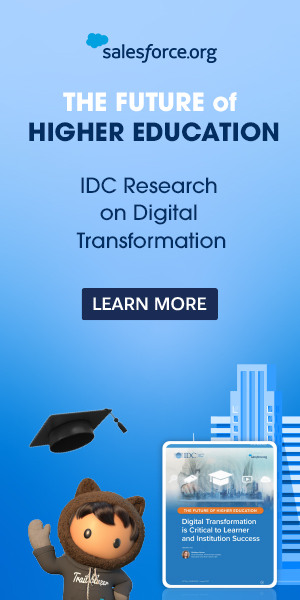Students remain focused on their future employability, but are universities measuring the right things when determining success?
Expectations of universities are higher than ever, particularly in terms of delivering and future-proofing students’ success. At a virtual round table hosted by Times Higher Education in partnership with Salesforce.org, a panel of experts discussed the student journey and how employability can be measured more effectively.
Santosh Carvalho, EMEA digital transformation and innovation lead at Salesforce.org, opened the discussion by commenting on the significance of students investing in their education. “Increasingly, this is the second largest debt for an individual apart from purchasing a home, so that’s got to generate an outcome that’s worthwhile for that individual,” Carvalho said.
Notably, Salesforce’s Connected Student Report found that 49 per cent of students felt long-term career prospects were a major determinant for them when choosing to attend university.
The long-term success of graduates must therefore remain a focus of universities’ student engagement strategies, and is something Michelle Nolan, director of academic programmes and student engagement and deputy director of academic services at the University of Sheffield, also commented on. “Lots of students, when picking a university, think they know where they want to be,” she said. “I think our duty is not necessarily to turn them out into a job, but for them to learn about themselves and to create that need in them to develop themselves and to think about their development as an ongoing thing."
But providing students with the tools for ongoing development is a difficult task, particularly in the age of blended learning. Tara Dean, provost of London South Bank University, said one successful technique she has identified is bringing in live projects from businesses, which give students the opportunity to engage with their future field from the classroom. “It’s thinking of different ways that employability can be brought in where the students do most of their learning,” she said.
Alice Ludgate, head of student services at the University of Plymouth, agreed. “Having connections with industry is really important,” she said. “That can be a challenge if you’re in a region like [the South West of England] where some of those industry partners are slightly further afield. Actually, the pandemic has made those connections easier, because there’s more remote working and the ability to engage from wherever you are in the world.”
The unique opportunity presented by the Covid-19 pandemic is something that Sara Ebbett, deputy director of careers and employability services at the Open University, also commented on. “[The pandemic] has levelled the playing field for quite a lot of [our students] because recruitment has moved online. Many opportunities, including insight days, work experience opportunities and virtual internships, are much more accessible,” she said. However, not everyone has responded positively to this change in learning style, which raises the question of how employability is being measured.
“Different individuals learn in different ways,” Carvalho said. “There was significant improvement in the student outcomes that we measured – the trade-off was [that universities] saw a drop-off in student well-being. They saw a disconnection from peers, they saw a disconnection from forming communities.”
“Now is the time when we have to make important strategic decisions in terms of the sort of institution we want to be and the type of programme we want to offer,” said Pascal Paschoud, executive director at Formation Continue UNIL-EPFL, University of Lausanne. “Do we really emphasise face-to-face teaching, or do we want to develop mainly online courses?”
As higher education institutions move forward with blended learning, finding a balance that supports student well-being as well as their career prospects is crucial.
The panel:
- Santosh Carvalho, EMEA digital transformation and innovation lead, Salesforce.org
- Tara Dean, provost, London South Bank University
- Sara Ebbett, deputy director of careers and employability services, the Open University
- Alistair Lawrence, special projects editor, Times Higher Education (chair)
- Alice Ludgate, head of student services, University of Plymouth
- Michelle Nolan, director of academic programmes and student engagement and deputy director of academic services, University of Sheffield
- Pascal Paschoud, executive director at Formation Continue UNIL-EPFL, University of Lausanne
Watch the round table on demand above or on the THE Connect YouTube channel.
Find out more about Salesforce.org.



























